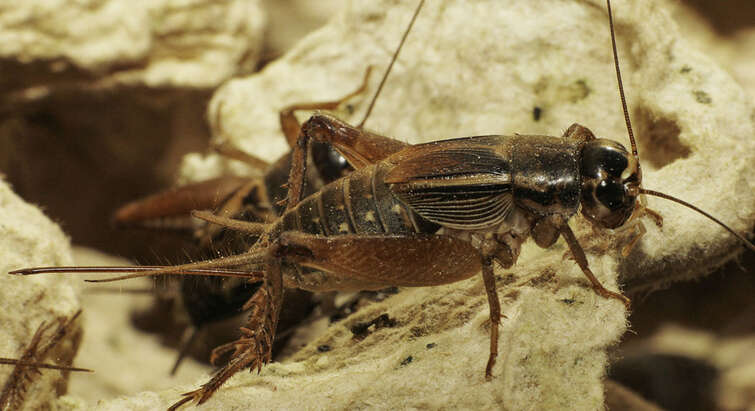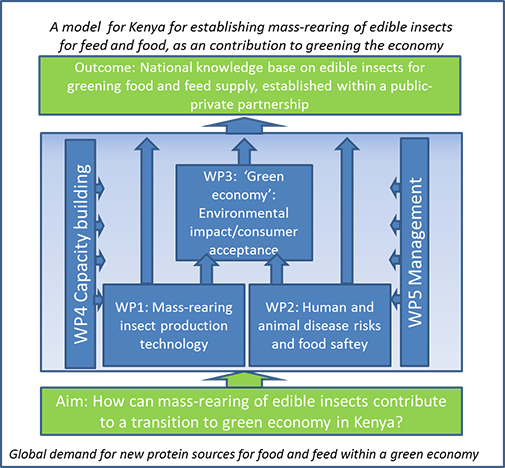
About the project
Mass- production of insects can contribute to the food supply both now and in the future. GREEiNSECT is a collaborative research consortium of universities and private partners aiming to investigate how mass-production of selected insect species can be developed in Kenya as a nutritious food source, as well as a a novel protein source for animal feed.
The partners will investigate the technical aspects of developing insect mass-rearing systems in Kenya; their applications to food, nutrition, and feed security; and their economic and social impacts and acceptance.
Together this research will advise the potential of ‘greening’ the agricultural sector via insect production systems. GREEiNSECT contributes to research capacity building in Kenya by supporting PhD studies in the fields of insect production, food product development, and economics.
Work Packages
This project is divided into five distinct work packages (WPs).
Focus on the technological aspects of specific management systems for domesticated insect production; deliver relevant knowledge to promote development and innovation.
WP 1.1. Small scale production
Small-scale production systems for crickets have been tested at JOOUST on experimental basis. A PhD study will address questions to support the development of cricket farming suited for small-scale rural production. A management model will be developed and tested in a field trial with small scale farmers, assessing adaption of the technology, impact of production on household consumption and income.
WP 1.2. Medium-/large-scale production
Focus on bioconversion of agriculture and industrial waste products for fly larvae production for animal feed. A PhD study will identify technological barriers and potential waste product resources for establishing mediumand large-scale production (primarily soldier flies) in Kenya.
WP 1.3. Potential contribution to green agribusiness
This research will investigate economic and political incentives for and the overall economic viability of the establishment of an insect-based feed production in Kenya.
WP 2.1. Disease and food safety assessment
This WP will estimate the human and animal health risks associated with the mass-rearing of insects.
WP 2.2. Recommendations for regulations of production and trade
On the basis of WP 2.1 provide recommendations for enhancing food safety and quality control of edible insects in Kenya, and for international trade
WP 3.1. Life cycle assessment (LCA) of insect production systems:
LCA will be applied as a tool to analyse the consequences of introducing insect production systems in Kenya, and contribute supporting or rejecting insect production as a sustainable food source.
WP 3.2. Insect-based processed food products
Focus on the development of local insect-based food products.
WP 3.3. Consumer acceptance and ‘willingness-to-pay’ of insect-based processed products:
The potential demand for insect-based food and feed products in Kenya will be assessed though ‘willingness-to-pay’ and consumer acceptance surveys.
WP 4.1. Capacity building:
GREEiNSECT will provide continuous support to capacity building of Kenyan partner institutions through support of PhD students. The PhD students will conduct individual research, but in the spirit of collaborative research along with the other PhD students from Kenya and Denmark.
WP 4.2. Dissemination
International dissemination of project outcomes will be carried out through 1) scientific publications of research findings; 2) communication to ostakeholders on a national level and international level through the specific networks of GREEiNSECT partners.
WP 5.1. Steering committee meetings/consortium communication
The project coordinator will oversee that the project work plan and administration are carried out efficiently. An inception workshop will be held in Kenya at the initial phase of the project, and a steering committee with representation of one principal researcher from each partner institution will be appointed. Steering committee and consortium meetings will be held in connection to research assemblies (minimum three times).
WP 5.2. Project reporting
The project coordinator will oversee that annual and final reporting and accounting is conducted in a timely and efficient manner.
The GREEiNSECT model:

Furthermore, international partners from SE Asia will advance the progress of the project through their experiences with the edible insect sector. International knowledge dissemination will be supported by FAO.
Research Objectives
The overall aim of GREEiNSECT is to investigate the use of edible insects as a concrete tool for developing a new, sustainable and inclusive component of the food and feed sector in Kenya, and to contribute to a transition towards a greener economy.
The specific research and capacity building objectives of this project are:
To generate knowledge of edible insect production systems for small- to large-scale enterprises, which address appropriate technologies in the urban and rural Kenyan context.
To assess the risks and food safety threats of the mass-rearing of insects on human, animal and environmental health, and to provide evidence for an institutional framework advising the development of national and international regulations for insects as food and feed.
To investigate how promotion of small- to large-scale mass-rearing of domesticated edible insects can contribute to the development of green economy in Kenya, channeled through public-private partnerships and markets for insect-based food and feed products.
To strengthen research collaboration and research capacity of Kenyan institutions in collaboration with private partners, in order to support a platform for interdisciplinary and innovative research on insects as an inclusive and green economic opportunity.
To strengthen the national and international outreach of the knowledge generated from this research consortium.
Time frame
January 2014 - December 2017
Source of financing
News

